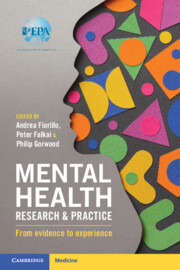Book contents
- Mental Health Research and Practice
- Mental Health Research and Practice
- Copyright page
- Contents
- Contributors
- Preface
- Chapter 1 Chemical and Behavioral Addictions
- Chapter 2 Nonsuicidal Self-Injury in Adolescents
- Chapter 3 Consultation-Liaison Psychiatry and Psychosomatics
- Chapter 4 Recent Developments in Cultural Psychiatry
- Chapter 5 New Perspectives in Eating Disorders
- Chapter 6 Emergency Psychiatry
- Chapter 7 How Can Forensic Psychiatry Contribute to Legal and Ethical Controversies in Society?
- Chapter 8 Diagnosis of Co-occurrent Mental Health Problems in Persons with Intellectual Disability, Major Communication and Insight Difficulties, and Stressor-Related Disorders
- Chapter 9 Attention Deficit Hyperactivity Disorder in Adults
- Chapter 10 Translational Neuroimaging in Psychiatry
- Chapter 11 Challenges in the Therapy of Psychiatric Disorders in the Elderly
- Chapter 12 Position-Taking
- Chapter 13 Physical Health of Patients with Schizophrenia
- Chapter 14 Evolving Concepts for the Assessment and Treatment of Schizophrenia
- Chapter 15 The Role of Rapid-Acting Antidepressants in Suicidal Crisis Management
- Chapter 16 Telemental Health Care
- Chapter 17 Development and Current Status of ICD-11 Mental, Behavioral, or Neurodevelopmental Disorders
- Chapter 18 Anxiety Disorders
- Chapter 19 Did We Lose Interest and Pleasure in the Concept of Major Depression?
- Chapter 20 Personality Disorders
- Index
- References
Chapter 18 - Anxiety Disorders
Published online by Cambridge University Press: 01 February 2024
- Mental Health Research and Practice
- Mental Health Research and Practice
- Copyright page
- Contents
- Contributors
- Preface
- Chapter 1 Chemical and Behavioral Addictions
- Chapter 2 Nonsuicidal Self-Injury in Adolescents
- Chapter 3 Consultation-Liaison Psychiatry and Psychosomatics
- Chapter 4 Recent Developments in Cultural Psychiatry
- Chapter 5 New Perspectives in Eating Disorders
- Chapter 6 Emergency Psychiatry
- Chapter 7 How Can Forensic Psychiatry Contribute to Legal and Ethical Controversies in Society?
- Chapter 8 Diagnosis of Co-occurrent Mental Health Problems in Persons with Intellectual Disability, Major Communication and Insight Difficulties, and Stressor-Related Disorders
- Chapter 9 Attention Deficit Hyperactivity Disorder in Adults
- Chapter 10 Translational Neuroimaging in Psychiatry
- Chapter 11 Challenges in the Therapy of Psychiatric Disorders in the Elderly
- Chapter 12 Position-Taking
- Chapter 13 Physical Health of Patients with Schizophrenia
- Chapter 14 Evolving Concepts for the Assessment and Treatment of Schizophrenia
- Chapter 15 The Role of Rapid-Acting Antidepressants in Suicidal Crisis Management
- Chapter 16 Telemental Health Care
- Chapter 17 Development and Current Status of ICD-11 Mental, Behavioral, or Neurodevelopmental Disorders
- Chapter 18 Anxiety Disorders
- Chapter 19 Did We Lose Interest and Pleasure in the Concept of Major Depression?
- Chapter 20 Personality Disorders
- Index
- References
Summary
Anxiety Disorders (ADs) are the most prevalent mental disorders worldwide and are characterized by a wide variety of psychological and somatic symptoms, which are often misinterpreted as symptoms of a medical condition. ADs carry a large disease burden that impacts negatively on patients’ health-related quality of life and global life satisfaction and disrupts important activities of daily living. In this chapter we analyze the epidemiology and clinical presentation of ADs, highlighting recent innovations and changes in the classification of anxiety disorders in DSM-5 and ICD-11. Main available pharmacological and nonpharmacological therapies for the treatment of ADs, based on the most recent clinical evidence and updated literature, are presented as well. Lastly, we focus the attention on future perspectives about ADs, examining clinical correlations of peripheral biomarkers, neuroimaging, genetics, epigenetics, and microbiota data. These features may be useful to achieve further insight in terms of physiopathology, to support early diagnosis, and to facilitate the prediction of illness susceptibility and treatment response, in order to support clinicians’ practice and to develop personalized treatment strategies.
Keywords
- Type
- Chapter
- Information
- Mental Health Research and PracticeFrom Evidence to Experience, pp. 317 - 340Publisher: Cambridge University PressPrint publication year: 2024

